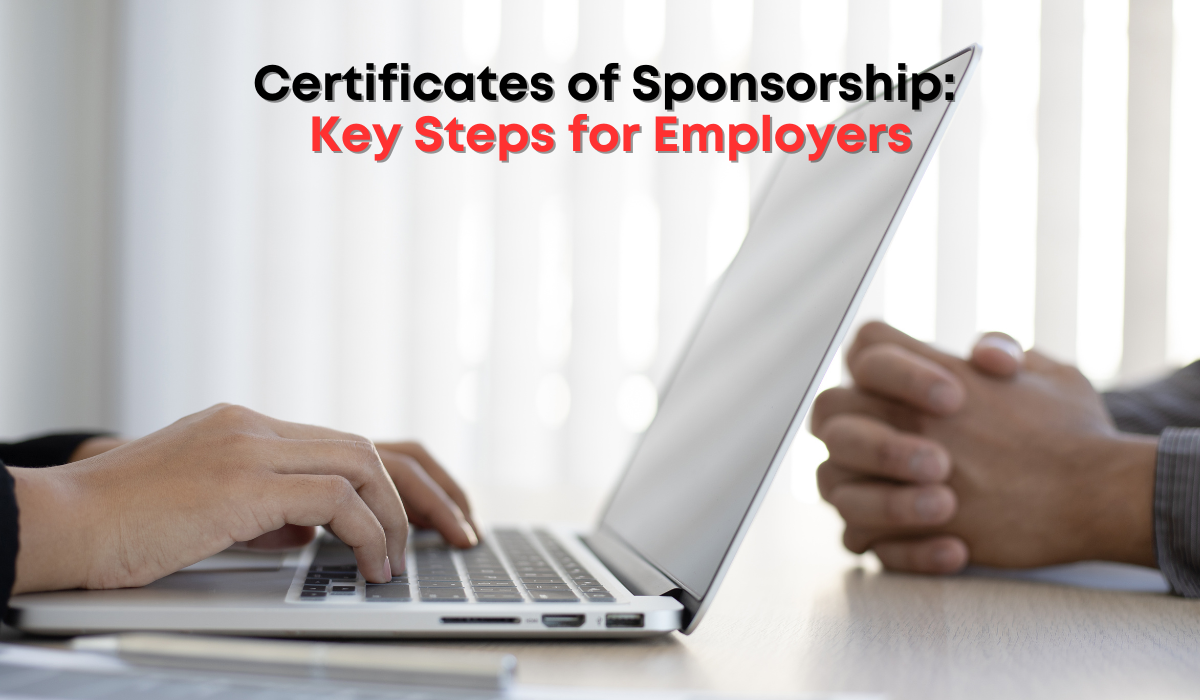Navigating the UK’s immigration rules is no small feat for employers, particularly when it comes to Certificates of Sponsorship (CoS). These digital records are integral to the UK’s points-based immigration system, serving as the bridge between global talent and UK businesses. Yet, the complexity surrounding CoS can pose significant risks for employers, from visa refusals to Home Office penalties.
In this guide, we unpack the essentials of Certificates of Sponsorship, explore the types available, and provide actionable insights to ensure compliance with immigration laws.
What Is a Certificate of Sponsorship?
A Certificate of Sponsorship (CoS) is a mandatory digital record that allows employers to confirm to UK Visas and Immigration (UKVI) that a foreign worker meets the conditions for a specific visa route. Despite its name, a CoS is not a physical document but an electronic reference number used in visa applications.
The CoS includes details about the job, such as title, salary, and start date, as well as the worker’s personal information. By issuing a CoS, employers affirm that the employment complies with immigration requirements.
When Is a Certificate of Sponsorship Required?
A CoS is necessary for non-UK nationals applying for a work visa under various categories, including:
- Skilled Worker visa
- Global Business Mobility visas
- Scale-Up Worker visa
- Minister of Religion visa
- International Sportsperson visa
- Seasonal Worker visa
Each visa type has specific conditions, such as skill levels and salary thresholds, making the role of the CoS pivotal in ensuring a successful application.
Types of Certificates of Sponsorship
Following updates to the Immigration Rules in 2020, there are three main types of Certificates of Sponsorship:
- Defined Certificate of Sponsorship (DCoS):
- For workers applying from outside the UK under the Skilled Worker visa.
- Must be approved by UKVI on a case-by-case basis.
- Undefined Certificate of Sponsorship:
- For workers already in the UK switching or extending their visas.
- Assigned directly through the employer’s Sponsor Management System (SMS).
- Temporary Worker Certificate of Sponsorship:
- For roles under the Temporary Worker visa category, such as charity or creative workers.
The Sponsorship Process: Step by Step
- Obtain a Sponsor Licence
Before issuing a CoS, employers must secure a Sponsor Licence. This involves demonstrating that the business is legitimate, financially stable, and capable of meeting sponsorship duties, such as monitoring employees and reporting changes to UKVI.
- Use the Sponsor Management System (SMS)
Once a licence is obtained, employers gain access to the SMS, an online portal for managing sponsorship activities. This system allows employers to request or assign CoS, report changes, and comply with ongoing duties.
- Determine the Correct CoS Type
Employers must identify whether they need a Defined or Undefined CoS. Defined CoS are for applicants outside the UK, while Undefined CoS are for those already in the country.
- Assign the Certificate of Sponsorship
Employers input job details, including the Standard Occupational Classification (SOC) code, into the SMS to generate a CoS. The worker uses the unique reference number to apply for their visa.
- Monitor and Report Changes
After assigning a CoS, employers must monitor the worker’s employment status and report changes, such as job role adjustments or contract terminations, via the SMS.
Compliance and Avoiding Common Mistakes
Compliance with CoS rules is non-negotiable. Missteps can result in severe penalties, including licence suspension or revocation. Common errors include:
- Incorrect SOC Codes: Using the wrong SOC code can invalidate a CoS, leading to visa rejections. Employers should cross-reference the latest UKVI guidance.
- Salary Thresholds: Failing to meet minimum salary requirements risks the CoS being invalid. Always verify the thresholds for the relevant visa route.
- Delays or Expiration: CoS must be assigned promptly and used within three months. Procrastination can lead to expiration and additional costs.
- Breach of Licence Duties: Sponsors must adhere to their compliance duties, including record-keeping and timely reporting of changes.
Costs of Sponsorship
Sponsoring a worker involves various costs, including:
- CoS Assignment Fee: £239 for Skilled Worker and other long-term visa categories; £25 for Temporary Worker routes.
- Sponsor Licence Application Fee: £536 for small businesses; £1,476 for larger organisations.
- Immigration Skills Charge: £364–£1,000 for the first year, depending on the sponsor’s size.
These fees reflect the financial commitment required to access global talent, underscoring the importance of strategic workforce planning.
Why Employers Need Expert Guidance
Given the high stakes, employers should seek expert advice to navigate the CoS process. Immigration solicitors can help ensure compliance, mitigate risks, and streamline sponsorship applications.
At GigaLegal Solicitors, we specialise in helping businesses secure sponsor licences, manage CoS allocations, and avoid costly penalties. Our tailored solutions ensure your sponsorship processes align with Home Office regulations, allowing you to focus on growing your business.
Final Thoughts: Streamlining Global Talent Acquisition
In today’s competitive landscape, securing international talent is often the key to business success. However, the complexities of Certificates of Sponsorship require meticulous attention to detail and robust compliance measures. By understanding the rules and enlisting professional support, employers can unlock the potential of a global workforce while avoiding regulatory pitfalls.
For more information or assistance with your sponsorship obligations, contact us today or read our detailed guides on the Sponsor Licence Application and Skilled Worker Visa.
Get in touch: For a comprehensive understanding of your options or queries on UK immigration matters, contact GigaLegal Solicitors at 02074067654 or click here to book a no-obligation consultation with an immigration expert.


